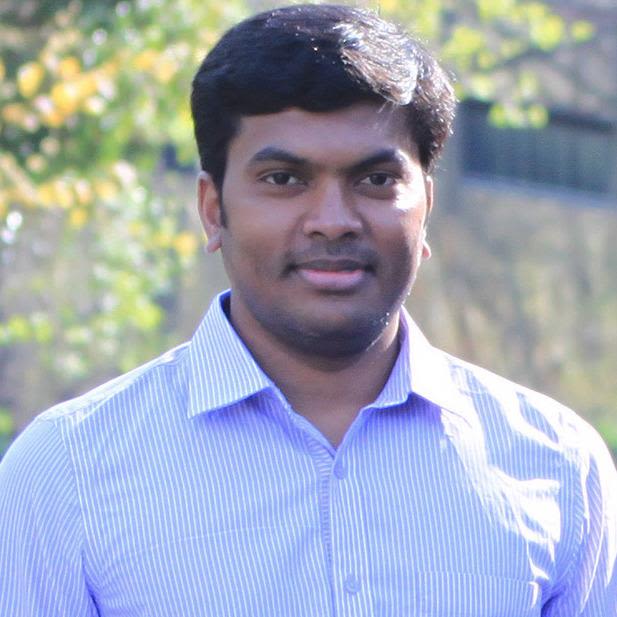Senthil Chinnakannan

Contact information
senthil.chinnakannan@ndm.ox.ac.uk
01865 281542
https://www.expmedndm.ox.ac.uk/team/senthil-chinnakannan/view
Research groups
Senthil Chinnakannan
PhD
Postdoctoral Scientist - Immunology/Vaccinology
Vaccine design and development - Hepatitis B, Hepatitis C and Cancer
Biography:
After completing a PhD in molecular virology at the Pirbright Institute, I moved to the NDM in May 2012. Since then I have been working on Adenoviral and MVA viral vectored vaccine platform. Initially I worked in Prof. Sarah Gilbert’s group, at the Jenner Institute, on Chimp-Adeno and MVA viral vector modifications and the flu vaccine development program and then moved to Prof. Ellie Barnes group at Peter Medawar Building (PMB). In association with Prof. Ellie Barnes, Prof. Paul Klenerman, Dr Lian Lee and Dr Jonathan Kwok at the Peter Medawar building, I am currently working on the translational research programs involving the design and development of viral vectored vaccines for hepatitis B, hepatitis C and cancer.
Research interests:
My research is primarily focussed on translational research in vaccinology and the current interests are on the development of (i) prophylactic Hepatitis C vaccine (ii) therapeutic Hepatitis B vaccine and (iii) minigene based cancer vaccine using Adeno and MVA viral vector platforms. Research interests, within our vaccine group, range from vaccine design, development, pre-clinical and clinical testing. Our vaccine group are also involved in the immunological assessment of Phase-I/II human clinical studies of the therapeutic HBV vaccines for Vaccitech.
Current projects:
Cancer vaccine: Utilizing a minigene cancer vaccine that can induce inflationary memory CD8 T-Cells, Prof. Paul Klenerman, Dr. Lian Lee, Dr. Jonathan Kwok and I have demonstrated that a minigene cancer vaccine can control tumors in pre-clinical cancer models. We are aiming to clinically translate this concept to enable affordable cancer therapy.
Therapeutic Hepatitis B vaccine: Highly effective prophylactic Hepatitis B vaccines are available, but they lack therapeutic effect on chronic hepatitis B. Two major issues with chronic hepatitis B are (1) the presence of persistently infected hepatocyte [due to the establishment of a mini-chromosomal form of HBV DNA, termed as cccDNA, within the nucleus of infected hepatocytes, which serves as a continuous source of new virus production] and (2) functionally exhausted HBV-specific CD8 T-cells, which fail to mount an effective anti-HBV response within a chronically HBV infected individual. A recent immuno-therapeutic proof of concept study, using a HBV-like woodchuck hepatitis virus, suggests that combining a vaccine that could elicit T-Cell response and an immuno-modulator (anti-PDL1) that could reverse the exhaustion, could potentially have a therapeutic effect (clearance of persistently HBV-infected hepatocytes) on chronic Hepatitis B. Moving down this path, we have generated a Chimpanzee-Adeno viral vector based hepatitis B vaccine, which could be used in combination with an immuno-modulators to device an immuno-therapy to overcome chronic hepatitis B. The therapeutic HBV vaccine has been licensed to Vaccitech and we are currently testing the vaccine in combination with anti-PD1 in phase 1b/2a clinical studies.
Prophylactic Hepatitis C vaccine: Hepatits C virus (HCV), due to its high replication rate and lack of proof-reading activity of its RNA polymerase, is a diverse pathogen and there are 6 major genotypes and more than 80 subtypes. We have developed a second-generation prophylactic Hepatitis C vaccine, aiming to induce protection across different HCV genotypes, which could potentially overcome the limited cross reactivity of the first-generation HCV vaccine (which is based on a single genotype that couldn't prove efficacy in Phase-II clinical testing). Currently we are conducting pre-clinical studies with the second-generation prophylactic Hepatitis C vaccine.
Recent publications
-
Divergent memory responses driven by adenoviral vectors are impacted by epitope competition.
Journal article
Colston JM. et al, (2019), Eur J Immunol, 49, 1356 - 1363
-
Prime-boost vaccination strategies using chimpanzee-adeno and MVA viral vectored vaccines encoding multiple HBV antigens (CPmutS) and class II invariant chain molecular adjuvants induces robust T-cell and anti-HBs antibody response in mice
Conference paper
Cargill T. et al, (2019), JOURNAL OF HEPATOLOGY, 70, E459 - E460
-
A novel chimpanzee adenoviral vectored HBV vaccine, encoding multiple HBV antigens with a shark invariant chain adjuvant, for use in HBV immunotherapy
Poster
Chinnakannan SK. et al, (2018), JOURNAL OF HEPATOLOGY, 68, S789 - S790
-
A pan-genotype HCV T cell vaccine, in a simian adenovirus vector, to target T cell epitopes conserved across multiple HCV genotypes
Conference paper
Donnison T. et al, (2018), JOURNAL OF HEPATOLOGY, 68, S800 - S801
-
The generation of a simian adenoviral vectored HCV vaccine encoding genetically conserved gene segments to target multiple HCV genotypes.
Journal article
von Delft A. et al, (2018), Vaccine, 36, 313 - 321
-
Novel Bivalent Viral-Vectored Vaccines Induce Potent Humoral and Cellular Immune Responses Conferring Protection against Stringent Influenza A Virus Challenge.
Journal article
Tully CM. et al, (2017), J Immunol
-
Enhancing cellular immunogenicity of MVA-vectored vaccines by utilizing the F11L endogenous promoter.
Journal article
Alharbi NK. et al, (2016), Vaccine, 34, 49 - 55
-
Investigation of IRES Insertion into the Genome of Recombinant MVA as a Translation Enhancer in the Context of Transcript Decapping.
Journal article
Alharbi NK. et al, (2015), PLoS One, 10
-
Different functions of the common P/V/W and V-specific domains of rinderpest virus V protein in blocking IFN signalling.
Journal article
Chinnakannan SK. et al, (2014), J Gen Virol, 95, 44 - 51
-
Morbillivirus v proteins exhibit multiple mechanisms to block type 1 and type 2 interferon signalling pathways.
Journal article
Chinnakannan SK. et al, (2013), PLoS One, 8
-
Detection of peste des petits ruminants virus antigen using immunofiltration and antigen-competition ELISA methods
Journal article
Raj GD. et al, (2008), Veterinary Microbiology, 129, 246 - 251
-
Performance of RT-PCR-ELISA for the detection of peste des petits ruminants virus
Journal article
Senthil Kumar C. et al, (2007), Small Ruminant Research, 72, 200 - 208


